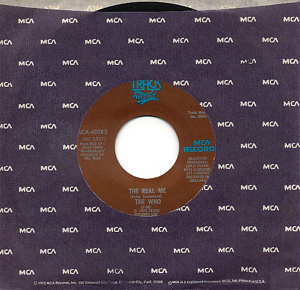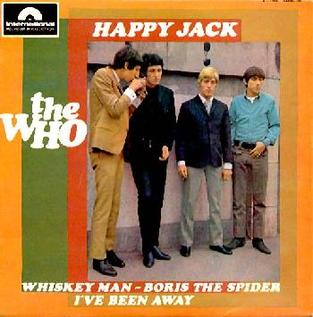Related Research Articles

The Who are an English rock band formed in London in 1964. Their core lineup consisted of lead vocalist Roger Daltrey, guitarist Pete Townshend, bassist John Entwistle and drummer Keith Moon. They are considered one of the most influential rock bands of the 20th century, and have sold over 100 million records worldwide. Their contributions to rock music include the development of the Marshall Stack, large PA systems, the use of the synthesizer, Entwistle and Moon's influential playing styles, Townshend's feedback and power chord guitar technique, and the development of the rock opera. They are cited as an influence by many hard rock, punk, power pop and mod bands, and their songs are still regularly played. The Who were inducted into the Rock and Roll Hall of Fame in 1990.

Peter Dennis Blandford Townshend is an English musician. He is co-founder, leader, guitarist, second lead vocalist and principal songwriter of the Who, one of the most influential rock bands of the 1960s and 1970s.

Quadrophenia is the sixth studio album by the English rock band the Who, released as a double album on 26 October 1973 by Track Records. It is the group's third rock opera, the two previous being the "mini-opera" song "A Quick One, While He's Away" and Tommy. Set in London and Brighton in 1965, the story follows a young mod named Jimmy and his search for self-worth and importance. Quadrophenia is the only Who album entirely composed by Pete Townshend.

The Who by Numbers is the seventh studio album by English rock band the Who, released on 3 October 1975 in the United Kingdom through Polydor Records, and on 25 October 1975 in the United States by MCA Records. It was named the tenth-best album of the year in The Village Voice Pazz & Jop critics poll.

"5:15" is a song written by Pete Townshend of British rock band The Who. Part of the band's second rock opera, Quadrophenia (1973), the song was also released as a single and reached No. 20 on the UK Singles Chart, while the 1979 re-release reached No. 45 on the Billboard Hot 100.

"The Real Me" is a song written by Pete Townshend on The Who's second full-scale rock opera, Quadrophenia in 1973. This is the second track on the album, although it is the first with lyrics. It concerns a boy named Jimmy, a young English Mod with four distinct personalities. The song describes how he angrily deals with several individuals to identify "the real me". The song was released as a single in the United States and Canada in 1974.

"Love, Reign o'er Me", subtitled "Pete's Theme", is a song by English rock band The Who. Written and composed by guitarist Pete Townshend, it was released on 27 October 1973 as the second single from the band's sixth studio album and second rock opera, Quadrophenia. It is the final song on the album, and has been a concert staple for years. The song peaked at number 76 on the US Billboard Hot 100 and number 54 on Cash Box.
"The Song Is Over" is a song by the English rock band the Who, appearing on Who's Next. It was originally to be the ending song on Lifehouse. It takes place after the police invade the Lifehouse Theatre and the concert goers disappear.
"Getting in Tune" is a song written by Pete Townshend and originally released by the Who on their 1971 album Who's Next. It was originally written as part of Townshend's abandoned Lifehouse project. Its lyrics describe the power of music, as well as reflect the inner contradictions Townshend was feeling at the time between his spiritual needs and his persona as a rock star. The music incorporates a number of changes in tempo and has been praised by critics for its use of dynamics.
"Sea and Sand" is a song by The Who. It was released on the group's 1973 rock opera album Quadrophenia, where it is the second track of the third side of the record.

"A Legal Matter" is a song written by Pete Townshend and recorded by the British rock band the Who for their debut album My Generation. It was recorded on 12 October 1965 at IBC Studios, and released both as the B-side to "The Kids Are Alright" in the U.S., and as the A-side of a single that reached number 32 in the UK. Both singles were released by Shel Talmy without the permission of the Who and were a result of a legal dispute between Talmy and the band at the time and an attempt to sabotage the release of the band's chosen single "Substitute".

"La-La-La-Lies" is the fourth track on the Who's debut album My Generation. It was written by lead guitarist Pete Townshend.

"Don't Let Go the Coat" is a song written by Pete Townshend and first released on The Who's 1981 album Face Dances.
"Another Tricky Day" is the ninth track on The Who's album Face Dances, written by Who guitarist Pete Townshend.
"Tattoo" is a song written by Pete Townshend that was first released by The Who on their 1967 album The Who Sell Out. A "rite of passage" song, "Tattoo" tells the story of two teenaged brothers who decide to get tattoos in their attempts to become men. Themes of the song include peer pressure to conform and young men's insecurity about their manhood. The song has been heavily praised by critics and has appeared on several of The Who's live and compilation albums. It has also been covered by Tommy Keene and Petra Haden.
"Bargain" is a song written by Pete Townshend that was first released by the Who on their 1971 album Who's Next. It is a love song, although the intended subject of the song is God rather than a woman. The song has been included on several compilation and live albums. It was also included on several of Townshend's solo projects. Critics have praised the song's lyricism and power, as well as the performance of the band on the song. Townshend acknowledged during the Who's concert at the Prudential Center in Newark on 19 March 2016 that this is his favorite song on the album.

"Happy Jack" is a song by the British rock band the Who. It was released as a single in December 1966 in the United Kingdom, peaking at No. 3 in the charts. It peaked at No. 1 in Canada. It was also their first top 40 hit in the United States, where it was released in March 1967 and peaked at No. 24. It was included on the American version of their second album, Happy Jack, originally titled A Quick One in the UK.

"Trick of the Light" is a song written by bassist John Entwistle for The Who's eighth studio album, Who Are You. It was released as the second single from the album, atypically with another Entwistle song, "905" on the B-side, but did not chart.

"It's Hard" is a song written by Pete Townshend that featured on British rock band The Who's tenth album, It's Hard, of which it was the title track. It was released as the third and final vinyl single from the album in 1983, backed with the John Entwistle written song "Dangerous", but failed to chart, although it reached number 39 on the Billboard Hot Mainstream Rock Tracks. This would become the last Who single of new material until "Real Good Looking Boy" in 2004, and the last album single by them until "Black Widow's Eyes", two years later.

The Who Tour 2012–2013 was their third to feature the 1973 album Quadrophenia. Billed as "Quadrophenia and More", the band played Quadrophenia in its entirety, followed by a selection of their greatest hits. Before starting the tour, the group gave a special performance at the closing ceremonies of the 2012 Summer Olympics.
References
- 1 2 3 4 Charlesworth, C. (1995). The Complete Guide to the Music of the Who. Omnibus Press. p. 54. ISBN 0711943060.
- ↑ Marsh, D. (1983). Before I Get Old. St. Martin's Press. p. 416. ISBN 0312071558.
- 1 2 3 4 Atkins, John (2000). The Who on Record: A Critical History, 1963-1998. MacFarland. pp. 181–182, 203–204. ISBN 9781476606576.
- 1 2 Cady, Brian. "'Quadrophenia' liner notes". The Hypertext Who. Archived from the original on 2010-07-02.
- 1 2 Grantley, S. & Parker, A.G. (2010). The Who by Numbers. Helter Skelter Publishing. p. 115. ISBN 9781905139262.
- 1 2 Segretto, M. (2014). The Who FAQ. Backbeat Books. pp. 67, 192, 337. ISBN 9781480361034.